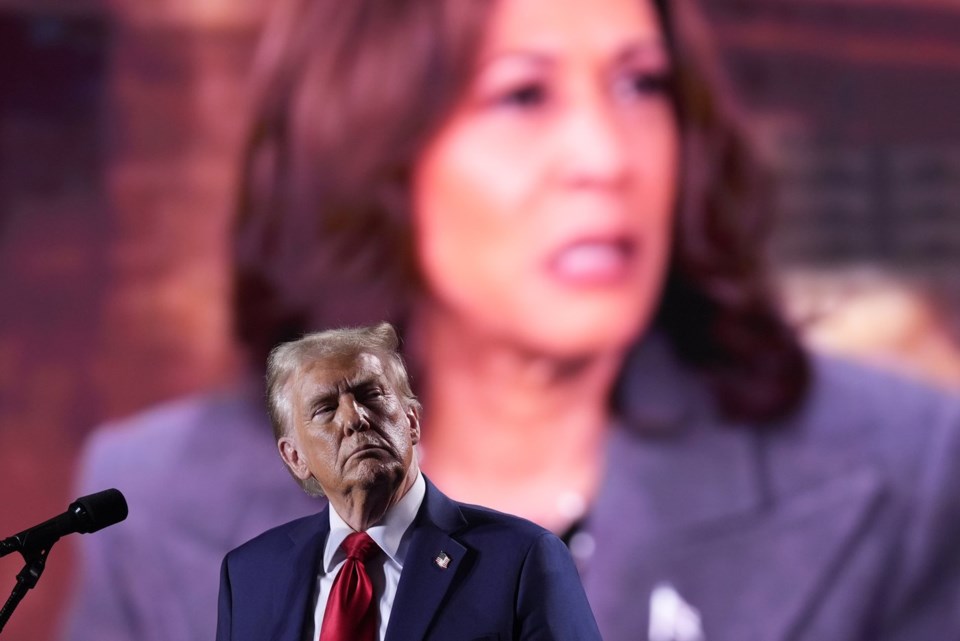TORONTO ŌĆö A new report suggests many Canadian business leaders are worried about economic uncertainties related to the looming U.S. election.
The survey by KPMG sa╣·╝╩┤½├Į of 735 small- and medium-sized businesses says 87 per cent fear the Canadian economy could become "collateral damage" from American protectionist policies that lead to less favourable trade deals and higher tariffs.
Due to those concerns, 85 per cent of Canadian business leaders polled said they are reviewing their strategies to prepare for a change in leadership, the report showed.
Dennis Darby said he was not surprised to hear that a large number of businesses are concerned about the U.S. election.
"They're trying to prepare themselves for a change," said Darby, president of Canadian Manufacturers and Exporters, in an interview Tuesday.
"That's partly because any potential protectionist measures that the U.S. takes ŌĆ” hurt both Canadian and U.S. manufacturers because our supply chains are integrated," he said.
The concerns are primarily being felt by larger Canadian companies and sectors that are highly integrated with the U.S. economy, the report found. That includes manufacturing, automotive, transportation and warehousing and energy and resources, as well as technology, media and telecommunications.
Darby recounted when Donald Trump was president and imposed tariffs on steel and aluminum imports.
"We were the collateral damage because we weren't the focus," he said. It took efforts from manufacturing sectors on both sides to explain the measures could hurt American companies, too.
Darby said if tariffs come in again, the cost of exporting to American companies will go up ŌĆö adding to inflationary pressures south of the border.
"It starts to increase costs for suppliers in the U.S. and that puts more pressure on Canadian manufacturers and vice versa," he said.
Potential tariffs could also put pressure on Canadian manufacturers to secure investments and maintain output, Darby added.
Canadian businesses are also concerned about their own competitiveness ŌĆö feeling pressure from the country's high tax policies and regulations, Darby said.
The survey showed nearly nine in 10 agree that if the U.S. introduces major tax cuts in the future, sa╣·╝╩┤½├ĮŌĆÖs higher personal and corporate tax rates and tax policies will seriously damage our competitiveness.
A majority also agreed that sa╣·╝╩┤½├Į's personal income tax rates undermine competition compared with other advanced economies, which makes it harder to recruit workers, the report said.
The survey aligns with a Canadian Chamber of Commerce report published earlier this month which issued a stark warning about the serious economic consequences of protectionist policies.
The report authored by Trevor Tombe, an economics professor at the University of Calgary, said while most Canadians recognize the importance of trade with the U.S., Americans donŌĆÖt have the same understanding about how intricately the two countries are connected.
Darby said it will be incumbent upon the Canadian government to remind the new U.S. government about the trade relationship, shared prosperity, and "the fact that we're each other's biggest customers."
He added small- and medium-sized manufacturers will have to work hard to maintain and be competitive in their supply chain even as they struggle to find skilled labour.
The prospect of further changes to economic and trade policies in the U.S. means some Canadian firms will need to look for ways to mitigate added costs and take advantage of potential trade relief provisions to remain competitive, said Shaira Nanji, a KPMG Law partner in its tax practice, in a news release.
Both presidential candidates have campaigned on protectionist policies that could cause uncertainty for Canadian trade, and whoever wins the White House will be in office during the review of the United States-Mexico-sa╣·╝╩┤½├Į Agreement in 2026.
This report by The Canadian Press was first published Oct. 22, 2024.
Ritika Dubey, The Canadian Press


